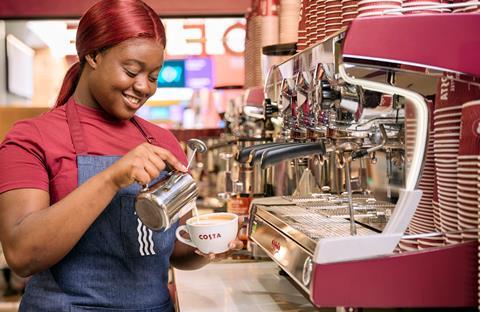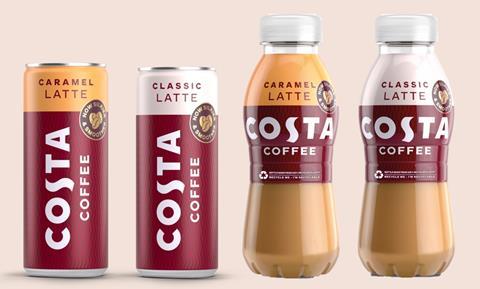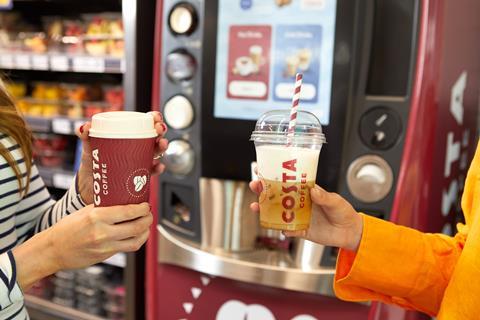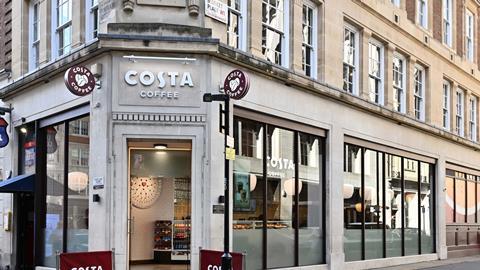A sale of Costa Coffee is on the cards and suitors have been named. Who else might be interested, and what are the growth opportunities?
Just six years after acquiring Costa coffee, The Coca-Cola Company wants to sell the chain.
That’s according to reports last week, which pointed to a 3% fall in the fmcg giant’s coffee sales last year – driven by Costa’s performance in the UK.
It is not the biggest of surprises, since out-of-home-focused Costa “sits somewhat awkwardly” in Coca-Cola’s soft drinks portfolio, says Clive Black, head of consumer research at Shore Capital.
However, even if Costa isn’t performing to its best under Coca-Cola, others see potential. So, who are the suitors circling the coffee chain? And what opportunities do they see?
Costa’s key problem is one of positioning, says Black. Other food-to-go players such as Greggs and McDonald’s have “eaten into the British coffee market at lower price points”, while more artisanal competitors like Gail’s are benefiting from “provenance, location, story and better food”.
Unlike Starbucks, Pret and Caffè Nero, Costa also missed out on a trend by failing to add matcha to its UK menu.

Who might want to acquire Costa?
Still the chain received initial interest. Apollo Management Group, owner of Wagamama’s parent company The Restaurant Group, is among private equity firms to have held talks with Coca-Cola’s adviser Lazard, along with US PE giant KKR, Sky News reported. Apollo could yet decide against tabling an offer, while KKR is unlikely to make one, sources say.
TDR Capital, majority owner of Asda, was this week named by the Financial Times as another potential bidder, having previously explored a deal for the coffee chain in 2018.
Retail industry commentator Howard Lake also suggests Keurig Dr Pepper, which last week moved to acquire Dutch coffee firm JDE Peet’s for €15.7bn. “Given Costa’s international footprint, KDP may see an opportunity to maximise the value from acquiring this established coffee specialist.”
Another name put forward by Lake is Mexico’s Grupo Femsa, best known for its Oxxo Convenience chain in Latin America. It could find Costa attractive, since it “recently bought out Café del Pacífico, owner of the Caffenio brand in Mexico” and “may seek to boost its reach in the coffee segment”, he says.
“Femsa also has European presence through its ownership of Swiss ‘foodvenience’ player Valora AG, and capturing Costa could be the springboard it needs for European expansion.”
However, it is likely a PE player will swoop in, “if only because of the real estate assets in play”, Lake adds.

Growth opportunities
The would-be buyer will be eyeing nearly 2,800 Costa Coffee shops in the UK and Ireland, plus the growth potential of its 12,000-plus Express machines in supermarkets and forecourts.
In 2023, the self-service coffee machines made a profit of £84.9m. That came in contrast to Costa’s overall £5.8m loss, driven by rising energy costs and increased staff wages.
Read more:
-
Asda owner TDR Capital among potential bidders for Costa
-
Costa Coffee revamps RTD range to reverse sales freefall
-
As Coca-Cola mulls Costa Coffee sale, what’s gone wrong?
-
Wagamama owner among potential bidders for Costa Coffee
GlobalData consumer analyst Ramsey Baghdadi says strategic investments in Express could yield “substantial returns”. The insights company forecasts a compound annual growth rate of 5.8% in hot packaged coffee between now and 2027 as demand grows in forecourts.
“Private equity companies can capitalise on this momentum,” says Baghdadi.
Kate Hardcastle, author of The Science of Shopping, says Costa Express is an “easy accelerator”. “I’d expect a private equity buyer to ask, how can we take this further? Maybe by upgrading the machines to offer even more choice, rolling them out to more locations, or integrating them with a slick app.”
A new owner is likely to see potential in modernising Costa’s digital ecosystem, which is “not yet firing on all cylinders”, Hardcastle adds. “In today’s market, the brands winning are the ones marrying convenience with personal connection, and that will mean tech-enabling the Costa experience.”

Then there is the question of international expansion. Costa operates over 1,300 stores internationally – an area Hardcastle suggests a PE buyer “might push harder into now that the brand has Coca-Cola’s global legacy to build on”.
“The goal will be to unlock Costa’s value quickly, because that’s how they’ll eventually make their return,” she adds.
However, one of Costa’s most valuable assets is a “nostalgia and warmth” for the brand, which any new owner must also “handle with care”, Hardcastle cautions. “You can pour money into new tech or flashy stores, but if you lose the heart of what makes Costa special, you’ve lost the plot.”




















No comments yet